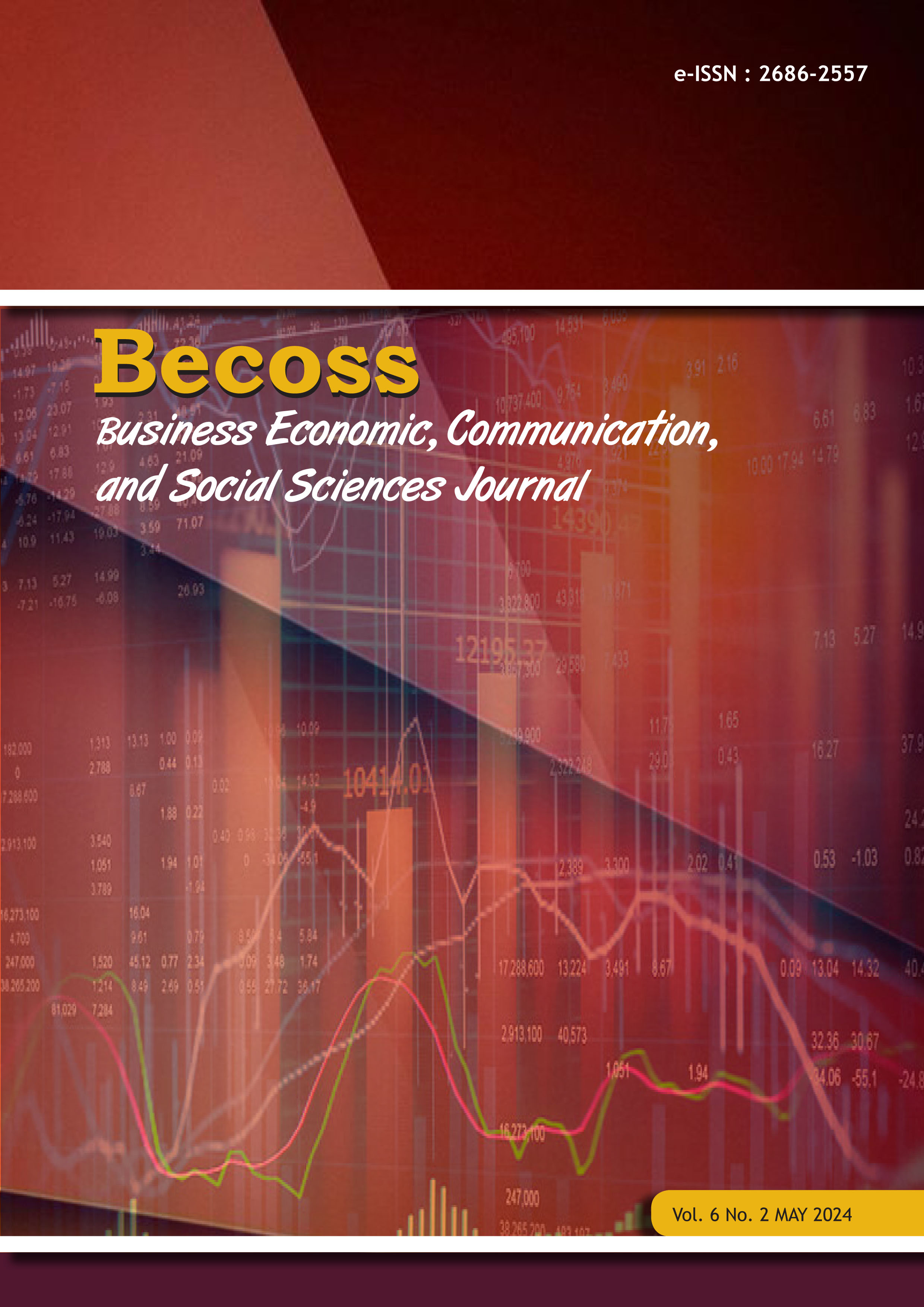Hubungan Bermain Peran Dalam Pembelajaran Daring Dengan Tingkat Perkembangan Sosial Emosional Anak Usia Dini
DOI:
https://doi.org/10.21512/becossjournal.v6i2.11766Keywords:
Online Learning, Socio-Emotional Development, Dramatic Play, Early ChildhoodAbstract
This study aims to examine the relationship between role play in online learning and the socio-emotional development level of early childhood. This study uses a quantitative method with 76 respondents from kindergarten and early childhood education teachers in DKI Jakarta. In measuring dramatic play, this study adapts Smilansky's Scale for the Evaluation of Dramatic and Socio-dramatic Play measuring instrument and in measuring social emotional development adapts the Social-emotional development assessment. The data obtained in this study are based on the results of respondents' observations. The results of this study found that there was a significant and positive relationship between role playing and social emotional development level. This is based on the results of the correlation coefficient analysis (r = 0.570, p < 0.05) and the linearity analysis of the scatter plot spreads diagonally on the graph. The result of the study suggests that the teacher can use the role-playing for increasing the development of social-emotional among early childhood.
References
Asmawati, L., & Hidayat, S. (2020). Parenting e-book: coping early childhood education problems during learning from home. Jurnal Pendidikan Anak Usia Dini 14(2). doi: 10.21009/JPUD.142.11
Brenchley, J. (2017). Social-Emotional Development Assessment: Scale Development for Kindergarten through Second Grade Youth Universal Screening.
Gayatri, M. (2020). Does early childhood education matter during COVID-19 pandemic. The 3nd International Conference on Technology, Education, and Social Science 2020, 8(6). doi: 10.18510/hssr.2020.866
Goldstein, T., & Lerner, M. (2017). Dramatic pretend play games uniquely improve emotional control in young children. Developmental Science, 21(4), e12603. doi: 10.1111/desc.12603. Dilansir dari: https://onlinelibrary.wiley.com/doi/abs/10.1111/desc.12603
Gravetter, F., & Forzano, L. (2016). Research Methods for The Behavioral Sciences (5th ed.). New York: Cengage Learning.
Guan, H., Okely, A. D., Aguilar-Farias, N., del Pozo Cruz, B., Draper, C. E., El Hamdouchi, A., … Veldman, S. L. C. (2020). Promoting healthy movement behaviours among children during the COVID-19 pandemic. The Lancet Child and Adolescent Health, 4(6), 416–418. https://doi.org/10.1016/S2352- 4642(20)30131-0
In, J. (2017). Introduction of a pilot study. Korean Journal of Anesthesiology, 70(6): 601-605. doi = 10.4097/kjae.2017.70.6.601. Dilansir dari: https://www.ncbi.nlm.nih.gov/pmc/articles/PMC5716817/pdf/kjae-70-601.pdf
Lau, E. Y. H., & Lee, K. (2020). Parents’ Views on Young Children’s Distance Learning and Screen Time During COVID-19 Class Suspension. Early Education and Development, 19. Doi: 10.1080/10409289.2020.1843925
Lee, S. J., Ward, K. P., Chang, O. D., & Downing, K. M. (2021). Parenting activities and the transition to home-based education during the COVID-19 pandemic. Children and Youth Services Review, 122, 105585. Doi: 10.1016/j.childyouth.2020.105585
Mariana, H. (2021). Maksimalkan Kecerdasan Anak, Sekolah Berkurikulum Internasional Terapkan Pendekatan Sosial-Emosional. Dilansir dari https://edukasi.kompas.com/read/2021/05/31/160700771/maksimalkan-kecerdasan-anak-sekolah-berkurikulum-internasional-terapkan
Mariana, H. (2021). Mengurai Risiko di Balik Penerapan PJJ jika Dilakukan Berkepanjangan. Dilansir dari https://www.kompas.com/edu/read/2021/05/21/160700571/mengurai-risiko-di-balik-penerapan-pjj-jika-dilakukan-berkepanjangan
Richard, S., Baud‐Bovy, G., Clerc‐Georgy, A., & Gentaz, E. (2020). The effects of a ‘pretend play‐based training’ designed to promote the development of emotion comprehension, emotion regulation, and prosocial behaviour in 5‐ to 6‐year‐old Swiss children. British Journal Of Psychology, 112(3), 690-719. doi: 10.1111/bjop.12484
Srihartini, Y., & Lestari, M. P. (2020). Pembelajaran pendidikan anak usia dini online di era pandemi COVID-19. Tarbiatuna: Journal of Islamic Education, 1(1). Dilansir dari: http://journal.laaroiba.ac.id/index.php/tarbiatuna/article/view/219
Taherdoost, H. (2016). Sampling Methods in Research Methodology; How to Choose a Sampling Technique for Research. International Journal of Academic Research in Management (IJARM), 2016, 5. ffhal-02546796f
Weisberg, D. (2015). Pretend play. Wiley Interdisciplinary Reviews: Cognitive Science, 6(3), 249-261. doi: 10.1002/wcs.1341lesta
Whitebread, D., Grau, V., Kumpulainen, K., McClelland, M., Perry, N., & Pino-Pasternak, D. (2019). The SAGE handbook of developmental psychology and early childhood education. UK: SAGE Publication. Dilansir dari: https://books.google.co.id/books?hl=en&lr=&id=b_idDwAAQBAJ&oi=fnd&pg=PA63&dq=pretend+play+in+early+childhood+education&ots=gDi57r_M9A&sig=k77SBL1oF9uq4EZCdZ6Z1Mcuk-Q&redir_esc=y#v=onepage&q=pretend%20play%20in%20early%20childhood%20education&f=true
Downloads
Published
How to Cite
Issue
Section
License
Copyright (c) 2024 Business Economic, Communication, and Social Sciences Journal (BECOSS)

This work is licensed under a Creative Commons Attribution-ShareAlike 4.0 International License.
Authors who publish with this journal agree to the following terms:
- Authors retain copyright and grant the journal right of first publication with the work simultaneously licensed under a Creative Commons Attribution License - Share Alike that allows others to share the work with an acknowledgment of the work's authorship and initial publication in this journal.
- Authors are able to enter into separate, additional contractual arrangements for the non-exclusive distribution of the journal's published version of the work (e.g., post it to an institutional repository or publish it in a book), with an acknowledgment of its initial publication in this journal.
- Authors are permitted and encouraged to post their work online (e.g., in institutional repositories or on their website) prior to and during the submission process, as it can lead to productive exchanges, as well as earlier and greater citation of published work.
USER RIGHTS
All articles published Open Access will be immediately and permanently free for everyone to read and download. We are continuously working with our author communities to select the best choice of license options, currently being defined for this journal as follows: Creative Commons Attribution-Share Alike (CC BY-SA)






